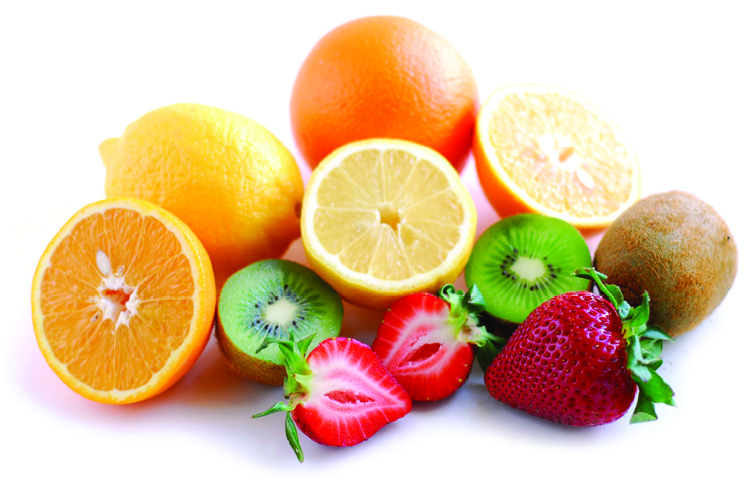Table of Contents
A renowned dietitian talks about the benefits of consuming fruits to alleviate common diseases
Fruit has always been recognised as one of the healthiest foods there is. Anthropological studies show fruits have been an important part of the human diet for hundreds of thousands of years. Fruits are goldmine of vitamins, minerals and fibre and are ideal to be consumed at least 4-5 servings in a day. Since they are in the natural form, fruits account for largest part of water and are cholesterol free. Hence, it’s much easier for the body to process and absorb the vitamins and minerals from fresh fruits.
In conjunction with International Fruits Day on July 1, MBG Fruitshop is taking the inititaive to educate the public on the benefits of eating fruits (or drinking fruit juices). And helping MBG to explain the virtues of eating fruits in this three-part series is none other than the renowned Consultant Dietician, Indra Balaratnam.
There’s no miracle wish you can make to give you instant good health. Unfortunately, destiny doesn’t quite work like that. People who attain and maintain good health are actually more aware of what it takes to achieve it.
Good health is a combination of practices:
- Living a sane, healthy lifestyle that is free from abusing ones body with excessive use of harmful substances such as smoking, alcohol and drugs
- Eating well with an emphasis on balance, moderation and variety when it comes to dietary choices to maintain a body weight that is not too heavy, or too skinny
- Regular exercise to strengthen heart, lungs and muscles
- Getting sufficient rest and sleep – aiming for at least 8 hours each night
- Managing stress levels so that it does not cause mental distress that negatively affects your well being.
However, achieving good health and balance is posing to be very challenging for people today. According to the 3rd National Health and Morbidity Survey, 70% of Malaysians in all age groups ate unhealthy diets with insufficient intake of fruit and vegetables. On top of that, only 30% Malaysians exercise regularly. Call it the bane of modern living. For as much as science and technology makes life easier for us in many ways in improving our lives, it is not necessarily improving our quality of lives. It would seem that more and more people are being struck with diseases and conditions that eventually shorten their life span.
Good nutrition is an important factor in achieving and maintaining good health. Look at countries where their people live long and well such as Japan and the Mediterranean countries. One element to that is their diet, which is rich in plant based foods such as vegetables, fruit, whole grains; and moderate in lean protein such as fish and healthy oils.
Many of the chronic diseases and ailments suffered by men and women stand a better chance of being better prevented by following a sensible diet abundant of whole grains, fruit, vegetables, lean protein and healthy oils.
Unfortunately, many people compromise on the good sense of eating fresh produce. Instead, they fill their tummies with processed foods, fast and convenient foods that are commonly filled with saturated fat, salt and preservatives. Many of these processed foods also lose their natural vitamins and minerals from the processing of it.
Let’s take a look at several diseases and ailments and a diet rich in plant based foods such as fruit, vegetables and whole grains can help prevent:
Acne
Acne is caused when hair follicles on skin get clogged by an overproduction of oil or dead skin cells. It typically affects children as they reach puberty and enter teenagehood. Older adults can also experience acne breakouts due to hormonal changes. Acne can be a socially traumatising condition to have. Many teenagers who have it can become socially withdrawn as what they perceive their looks chips away their self esteem. The affects of acne can live long after the physical pimples have disappeared. Deep scarring of the skin can cause pock marks and blemishes that serve as a constant reminder of the acne problem.
Remedy: Nutrients that can minimise the effects of acne are those that are high in beta carotene (a compound that gets turned into active Vitamin A when the body requires it) and Vitamin C. These nutrients have antioxidative qualities that combat build-up of bacteria and over-production of oil in the skin glands. Fruits and vegetables rich in beta carotene are yellow-orange in colour such as papaya, mango, yellow capsicum, pumpkin and sweet potato.
Vitamin C on the other hand is found mainly in berries, such as blackberries, strawberries, etc, citrus fruit and leafy green vegetables. As teens may not like to eat fruit and vegetables, one simple way to help them get their nutrients to improve their acne condition is to blend up a juice. It is a much better drink substitute than those popular teenager juices such as sodas and sweetened soft drinks.
Tip: Include yellow-orange coloured fruit and citrus fruit such as mango, pineapple, oranges, tomato, grapefruit, carrot, and papaya for a beta carotene (Vitamin A) boost.
Hypertension
Hypertension is a condition where the pressure of the blood in the body is high. Men and women are both susceptible to hypertension. This puts a strain onto the heart and valves as it tries to deal with the increase pressure from within. Hypertension is one of the co-morbidity risk factors for a heart attack and stroke. You are literally a walking time bomb if you do not do something about it.
The American Heart Association recommends the DASH Diet (Dietary Approaches to Stop Hypertension) which is food focused around fresh fruit and vegetables, whole grains, low fat dairy and lean cuts of meat. If you don’t have hypertension, the DASH Diet can help you to prevent it.
But if you already have hypertension, the DASH Diet is mutually complementary to your medication that you are taking to control the condition. In fact, they recommend 4 servings each respectively of fruit and vegetables per day for a person who eats 1,800-2,200 calories to see positive results in the reduction of hypertension. The DASH Diet is supported by evidence that show by following sensible eating choices of the things mentioned before, you can reduce your elevated blood pressure. Fruit and vegetables contain good amounts of nutrients such as potassium that help to regulate and balance out the sodium content in blood – hence stabilising the high blood pressure more effectively.
7 to 9 servings of fruit and vegetables can be quite daunting for a majority of people – especially if they can barely consume 2 to 3 servings per day. This is where blending or juicing can help to complement your efforts to include more fruit and vegetables into your diet.
Tip: Include all kinds of fruit and vegetables into your main meals, such as slice up some fruit into your breakfast cereal; have a refreshing fruit juice with your lunch to cool down on a warm day and have an assortment of fresh cut fruit as a after dinner dessert.
Obesity
Not many people think of obesity as a disease, when in fact it is one. Because of that, they don’t foresee it as having a direct impact on their health. Obesity is in fact one of the leading risk factors of developing many health issues such as infertility, non-insulin dependant diabetes, hypertension, joint pains, heart disease, cancers, just to name a few.
The global population is becoming a fat, not fit group. The World Heart Federation places obesity as the 5th leading risks for death around the world. Our children are not spared as well, as obesity starts at a young age. Statistics show that there is a strong likelihood that an obese child can grow up to be an obese adult if sufficient measures in nutrition choices are not intervened on time.
Best remedy for combating obesity is the road that is tried and true – which is a sensible low fat, high fibre balanced diet and regular physical activity done so on a consistent basis. Fad diets may seem attractive in the beginning, but they are not long term, sustainable solutions. Fruit and vegetables are good food choices as they are natural low in calories and fat, as well contributes to a substantial amount of fibre in the diet. By replacing high calories foods with lower calorie produce can help you to feel full without eating too much.
Juicing and blending fruit and vegetables is a good way to down them without the hassle of eating a full meal. Juices can be grabbed on the go.
Tip: Choose fruit and vegetables with a high water content that will keep you full for longer such as watermelon, tomato, citrus fruit and pineapple.
Eye Disease
Eye Disease is the leading cause of visual disability in the elderly. Based on American statistics, it is estimated that 20 million Americans age 40 and above have cataract. This happens when the proteins in the lens of the eye are damaged, causing an opaque coating to impair vision. This causes blurriness, difficulty to see at night and sometimes even double vision. Cataract can be corrected by changing the lens via surgery or through laser treatment.
Age-related Macular Degeneration (AMD) affects almost 10 million American ages 60 and older. The macula is in the centre of the retina, located at the back of the eyeball. A healthy macula is needed for visual acuity especially to see fine details of an image. AMD occurs when the cells of the macula layer is damaged, hence making sharpness of vision reduced. A person with macula degeneration may find it hard to make out fine details. There is no cure for AMD.
Researchers have discovered the link between eye disease and certain key nutrients, namely Vitamin C, E carotenoids, beta carotene, lutein and zeaxanthin, omega-3 fatty acids, folic acid, Vitamin B6 and B12. A majority of these nutrients are richly abundant in fruit, vegetables, whole grains and lean meats.
Infertility
Modern times are seeing a surge in infertility, not just for the women but for men as well. There are several factors that put you at a higher rate of being infertile – namely obesity, lack of proper nutrition where you can end up deficient in important vitamins such as Vitamin D and folic acid, stress, and a poor overall lifestyle.
A lack of zinc has been connected to low sperm count in men and general low fertility in women. Zinc is found in seafood, fish, sunflower and pumpkin seeds. Vitamin B6 – found in whole grains, avocado, dairy products, broccoli, mushrooms, nuts, eggs and meats – plays a role in the health of the hormone progesterone, which is needed to boost fertility. Low iron levels effect the formation and function of red blood cells and is a factor in infertility as well. Iron is found abundantly in red meat and offal. Vitamin C in fruit and vegetables help with iron absorption from foods. It’s recommended to have a fruit juice together with your meal to help with iron absorption from the meal.
















